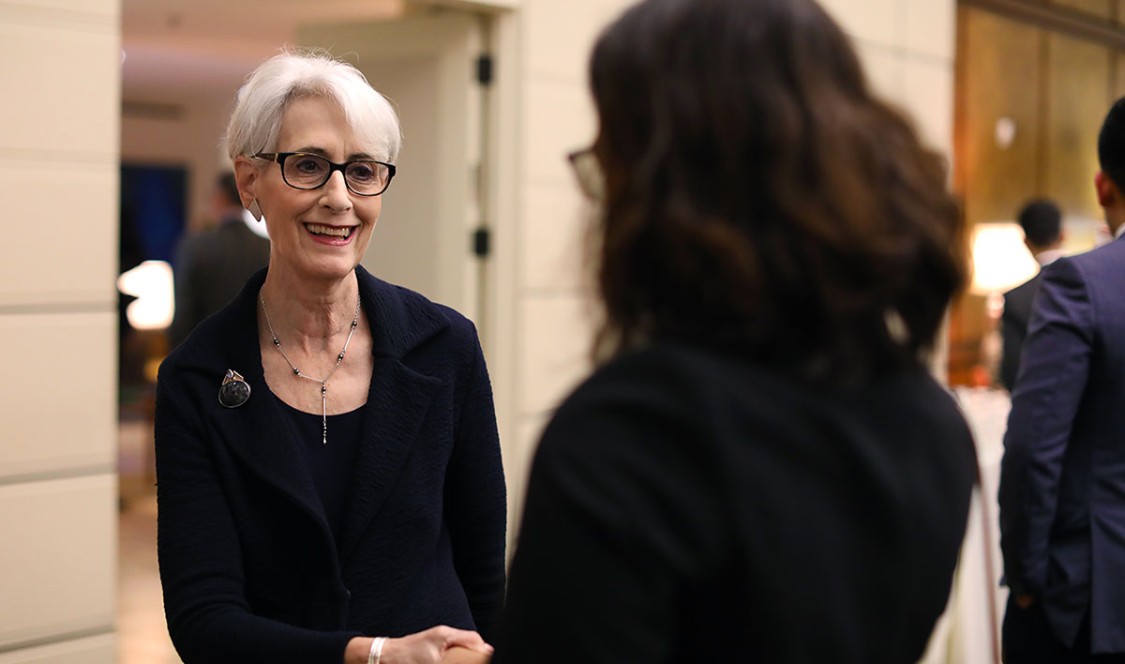Ambassador Wendy Sherman has been in some tough rooms before.
As lead negotiator for the Iran nuclear deal during the Obama administration, Sherman helped forge diplomatic relations with one of the United States’ most formidable adversaries for the first time since the late ’70s. Under President Bill Clinton, Sherman also had a front row seat to tense Israel-Palestine and North Korea negotiations. Often, she’s been the only woman at the table.
The overflow crowd Thursday night at the Marian Miner Cook Athenaeum was far more welcoming and gracious compared to the stern faces Sherman has often encountered during her decades as a diplomat. The ambassador, this semester’s featured Res Publica speaker, opened her remarks by praising Claremont McKenna for offering such a “student-centered experience” through the Ath.
“I do a lot of public speaking, and it is not always like this. At the head table, you’ll usually find the big donors,” Sherman said. “It’s a real tribute to the ethos of Claremont McKenna that it’s all about you (students) in the room tonight.”
During her 40-minute talk, Sherman drew thematically from her 2018 book, Not For the Faint of Heart: Lessons in Courage, Power, and Persistence. She recalled the moment, in 2013 at a United Nations meeting, when Secretary of State John Kerry met with an Iranian foreign minister for the first time, opening the door to nuclear de-escalation talks. As Kerry and his counterpart were having a private conversation in another room, Sherman thought to herself, “How did a social worker from northwest Baltimore end up negotiating with Iran?”
Sherman pointed to her upbringing in the city, specifically, a moment in 1963 that shaped her personal values. In solidarity with the Civil Rights movement, Sherman’s father publicly supported open housing and racial integration through his real estate firm. The position was unheard of in Baltimore at the time—and within six months, he lost more than 60 percent of his listings. By 1968, his office had closed.
“My parents never questioned their choice,” Sherman said. “They taught me the first ingredient for creating real change. Courage. And the understanding that real change always comes with a price. But when it is the right thing to do, it is worth the cost.”
Moral leadership has been a bedrock principle for Sherman during her accomplished diplomatic career. She’s had to summon inner courage and conviction to navigate disparate gender and power dynamics as one of the lone women of authority in high-level political settings. “Understanding power, and making good use of it, is crucial in diplomacy and in life,” Sherman said, noting how Madeleine Albright once told her that personal power as a woman was important, but it did not outweigh the responsibility of being a negotiating representative of the United States.
Sherman also spoke about finding common ground with foreign counterparts who not only had opposing geopolitical aims, but approached life with a different cultural worldview. Negotiating with conservative Muslims in Iran meant she couldn’t greet men with a handshake, but instead, had to press a right hand to her chest and give a slight nod. She joked that it often left her looking like she was “stuck in a Marx Brothers routine.”
But whether it was through social conversation, shared meals, or an honest assessment of personal and political differences, Sherman said she has learned in her diplomatic career that you can always “persist. ... and push for peace.”
“Most people in the world want to live their lives—raise their children, have good health, a decent job, and enjoy their family and their community. You can’t do that in the midst of violence and conflict,” Sherman said. “For me, trying to ensure that there is less conflict means there is less death. It means civilians get to live life. There is nothing more important.”
—Thomas Rozwadowski

